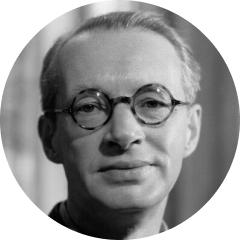Edwin Muir
(1887–1959)
Edwin Muir (1887–1959): Scottish poet, novelist, critic; translator (with his wife Willa) of Franz Kafka. TSE was to write to Leonard Woolf on 22 Aug. 1946: ‘I am anxious to do anything I can for Muir because I think highly of his best poetry and I think he has not had enough recognition.’ To Eleanor Hinkley, 25 Dec, 1955: ‘Edwin is a sweet creature, who never says anything when his wife is present, and only an occasional word when she isn’t. An evening alone with him is very fatiguing. But he is a good poet, and I believe, what is even rarer, a literary man of complete integrity. He is not really Scottish, but Orcadian – in other words, pure Scandinavian.’
On 1 Jan. 1959, when pressing the claims of Muir upon the Royal Literary Fund, TSE wrote to Alan Pryce-Jones: ‘I have a very high opinion indeed of Edwin Muir as a poet, and admire him particularly because his poetry has gone on gaining in strength in later years. And I think that both he and Willa deserve recognition because of their work in translation. It is through them, you remember, that Kafka became known in this country, as they translated, I think, all his novels.’ In a tribute (The Times, 7 Jan. 1959):
Muir’s literary criticism had always seemed to me of the best of our time: after I came to know him, I realised that it owed its excellence not only to his power of intellect and acuteness of sensibility, but to those moral qualities which make us remember him, as you say justly, as ‘in some ways almost a saintly man’. It was more recently that I came to regard his poetry as ranking with the best poetry of our time. As a poet he began late; as a poet he was recognised late; but some of his finest work – perhaps his very finest work – was written when he was already over sixty … For this late development we are reminded of the later poetry of Yeats; and Muir had to struggle with bad health also: but in the one case as in the other (and Muir is by no means unworthy to be mentioned together with Yeats) we recognise a triumph of the human spirit.
Willa Muir commented on TSE’s plaudits: ‘Eliot, in his desire to present Edwin as an orthodox Christian, overdid, I think, the desolations and the saintliness. Edwin’s wine could never be contained in any orthodox creed’ (letter to Kathleen Raine, 7 Apr. 1960).
TSE to Willa Muir, 9 Aug. 1962: ‘I think that Edwin’s collected poems will go on being enjoyed by true poetry lovers as long as the poems of any poet in our century.’ He would later say of Muir: ‘He was a reserved, reticent man … Yet his personality made a deep impression upon me, and especially the impression of one very rare and precious quality … unmistakable integrity’; and of his poems: ‘under the pressure of emotional intensity, and possessed by his vision, he found almost unconsciously the right, the inevitable, way of saying what he wanted to say’ (‘Edwin Muir: 1887–1959: An Appreciation’, The Listener, 28 May 1964, 872).
Muir’s works include An Autobiography (1954); Selected Poems of Edwin Muir, with preface by TSE (1966); Selected Letters of Edwin Muir, ed. P. H. Butter (1974).
